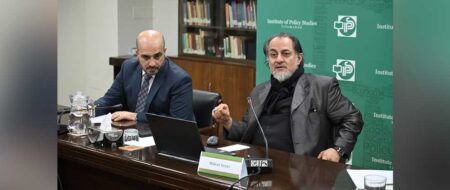Five Years of NATO
Former Ambassador to Afghanistan, Rustam Shah Mohmand, and former DG of the Institute of Strategic Studies, Islamabad and Security Analyst, Shireen M. Mazari, spoke in a seminar on “Five Years of NATO in Afghanistan: Implications For the Region” on August 22, 2008. Former Secretary General of Foreign Affairs, Pakistan, Akram Zaki chaired the meeting.
Activity: Public Seminar
Speakers: Rustam Shah Mohmand, former Ambassador to Afghanistan; Shireen M. Mazari, former DG of the Institute of Strategic Studies, Islamabad and Security Analyst.
Chair: Akram Zaki, former General Secretary, Ministry of Foreign Affairs, GoP
 Former Ambassador to Afghanistan, Rustam Shah Mohmand, and former DG of the Institute of Strategic Studies, Islamabad and Security Analyst, Shireen M. Mazari, spoke in a seminar on “Five Years of NATO in Afghanistan: Implications For the Region” on August 22, 2008. Former Secretary General of Foreign Affairs, Pakistan, Akram Zaki chaired the meeting
Former Ambassador to Afghanistan, Rustam Shah Mohmand, and former DG of the Institute of Strategic Studies, Islamabad and Security Analyst, Shireen M. Mazari, spoke in a seminar on “Five Years of NATO in Afghanistan: Implications For the Region” on August 22, 2008. Former Secretary General of Foreign Affairs, Pakistan, Akram Zaki chaired the meeting
Talking about the implications of NATO’s presence in the region for Pakistan, Ambassador Shah said, “It has caused destabilization, insurgency, lawlessness, frustration among the local people and above all growing anger and separatist sentiments within the country notably in Frontier and Balochistan provinces”.
Rustam Shah maintained that the presence of NATO was meant for stabilization and reconstruction of Afghanistan but it did the diametrically opposite, adding “The amount of opium production has increased manifold, and multiethnic groups have not only emerged but spread across Afghanistan which deepened the polarization of the country.”
 Ms. Shireen Mazari raised question over the legitimacy of NATO operations in Afghanistan as it was a collective defense organization mandated to work only within the North Atlantic boundaries and substantiated her claim by referring several clauses of the UN and NATO charter. She pointed out that the foreign interference in Afghanistan was not the result of 9/11 incidents; this intervention had its roots in the scenario emerged soon after the collapse of the USSR.
Ms. Shireen Mazari raised question over the legitimacy of NATO operations in Afghanistan as it was a collective defense organization mandated to work only within the North Atlantic boundaries and substantiated her claim by referring several clauses of the UN and NATO charter. She pointed out that the foreign interference in Afghanistan was not the result of 9/11 incidents; this intervention had its roots in the scenario emerged soon after the collapse of the USSR.
Concluding the session, Mr. Akram Zaki said that increasing insurgency both in Afghanistan and Pakistan was a direct result of foreign intervention and continued presence of coalition forces in the region. He observed that there was an unrelenting














